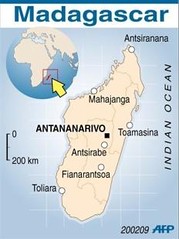
A map of Madagascar where there are reports of a military mutiny. The country has undergone political unrest between the government and opposition forces over the last several months.
Originally uploaded by Pan-African News Wire File Photos
17 Nov 2010 23:01:22 GMT
Standoff at barracks near capital's airport
Government says it's in control, backed by top brass
By Alain Iloniaina
ANTANANARIVO, Nov 18 (Reuters) - A small group of dissident soldiers were holed up in army barracks near the airport in Madagascar's capital on Thursday after threatening to topple the Indian Ocean island's government.
About 20 officers said on Wednesday they had set up a military council to run a country that has been mired in political gridlock since Andry Rajoelina drove former President Marc Ravalomanana into exile in March 2009.
Rebel officers asserted that they had already dissolved government institutions. But the centre of Antananarivo remained calm, ministries continued to function, the president seemed unruffled and the military top brass rallied behind the government.
"There was a letter threatening me with death if I didn't resign. It is thanks to God that I'm still here, -- Rajoelina told reporters late on Wednesday.
About a thousand protesters backing the rebels blocked the main road to the airport near the barracks, but security forces dispersed them with tear gas and pledged to crush any mutiny.
Rebel Colonel Charles Andrianasoavina said he was expecting other military units to join the mutiny on Thursday and that they still planned to seize the presidential palace, shut down government and close the international airport.
It was not immediately clear whether the army chiefs backing the government would try and negotiate an exit for the dissidents, or use force to nip the rebellion in the bud.
The military has endured several rifts since the 2009 coup. One of the rebels, General Noel Rakotonandrasana, initially backed Rajoelina's power grab and became armed forces minister. But he was sacked in April following rumours of a planned coup.
PEACEFUL REFERENDUM
The unrest occurred the same day Madagascar voted peacefully on a new draft constitution that would lower the minimum age for a president to 35, allowing 36-year-old Rajoelina both to stay in office until elections slated for May 4, 2011, and run again.
While analysts expected the referendum to pass, they said a low turnout would do little to help Rajoelina's attempts to legitimise his power grab in the face of widespread international censure.
Initial provisional results from a handful of polling stations in the region that includes the capital gave the -- Yes" camp a commanding lead, but with turnout of just 33 percent.
Rajoelina swept to power on the back of protests against Ravalomanana's increasingly autocratic rule. But his failure to deliver on populist pledges has eroded his popularity.
International mediators brokered a series of power-sharing agreements between Rajoelina, Ravalomanana and two other former presidents, but they all collapsed in bickering over the allocation of ministerial posts.
The three main opposition parties, each headed by one of the former presidents, boycotted the vote on the new constitution.
The United States and European Union have frozen development aid to Madagascar while the African Union eventually slapped sanctions on Rajoelina and about 100 of his backers in March this year, underlining his diplomatic isolation.
The political crisis has hammered the economy in the world's fourth largest island, where foreign firms are developing its oil, nickel, cobalt and uranium deposits.
The new tension in Madagascar helped push volatile nickel prices 5 percent higher. The island hosts the Ambatovy project that is due to be completed by January 2011 and produce 60,000 tonnes of nickel a year once it hits full speed. (Writing by David Clarke; editing by Mark Heinrich)
No comments:
Post a Comment